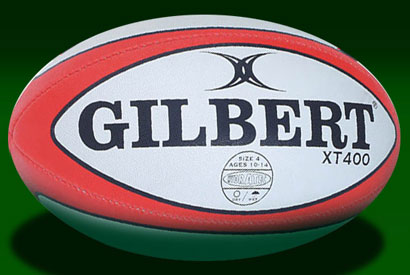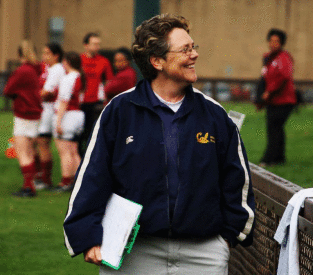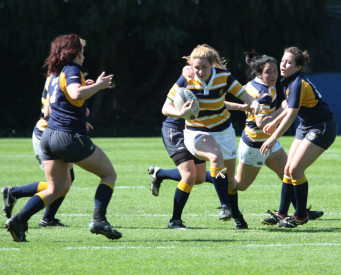Tackling the challenges of women’s rugby
Capital Projects' Ellen Owens tried "finesse sports," but preferred a game "where, if someone had the ball and you wanted it, you could take it — knocking them down if you had to." After nine seasons as head coach, she's now director of rugby for the Cal women's team, which placed fourth in this year's 7s National Championships.

December 2, 2013
It’s been more than 30 years since Ellen Owens, a project manager with UC Berkeley Capital Projects, got involved with rugby, and she can tick off a laundry list of important lessons the sport has taught her in that time.
“Preparation and hard work yield good results… If you can work well with other people, you can reach goals you can’t reach on your own… You are stronger than you think you are — both physically and mentally.”
Yet what originally drew Owens to rugby was a bit less lofty: She liked the idea of jumping on people and slamming them to the ground.

Coach Owens watches her team from the sidelines, circa 2010. (Caroline Snijder van Wissenkerke photo)
“I’d never heard of rugby, growing up,” says Owens, who recently became director of rugby for the Cal women’s team after serving as head coach for nine seasons. “But then when I was starting college a friend from high school gave me a call and said, ‘You need to sign up for rugby. It’s the greatest sport. You get to tackle people!'”
That appealed to Owens, who says she’d tried “finesse sports” and found they didn’t suit her. Something more raucous and hard-hitting sounded like just the ticket, though.
“I liked the idea of a sport that young women could play where, if someone had the ball and you wanted it, you could take it — knocking them down if you had to,” she says.
Despite her attraction to the grittier side of the game, Owens was hardly the stereotype of a bruiser when she started playing: She was an 18-year-old, five-foot-two Yale freshman majoring in architecture. And she didn’t think of herself as particularly aggressive or assertive — just “straightforward.” But her friend’s hunch about her and rugby was right. For Owens, it was love at first scrum.
“I loved the game immediately,” she says. “It took a while, but once I learned the ins and outs, I also began to appreciate the tactics and the techniques and the flow of play. I found that there was a lot more to it than the rough-and-tumble aspect.”
Rugby got its start in the early 1800s when students at an English boarding school grew tired of old-fashioned football (what Americans know as soccer) and just started picking up the ball and running with it. Other students did what came naturally: They tried to grab the ball back and run in the opposite direction. And so a sport was born.
It made its way to the United States not long afterward. There were rugby clubs in San Francisco as early as 1872, and Cal has had a men’s team since the 1880s. But the sport didn’t start to catch on with women until around the time Owens discovered it. And even then, it took a while longer for some old attitudes about the game to change.
“When I was playing in the early ’80s, if people saw you wearing a rugby jersey they’d say, ‘Where did you get that? Does your boyfriend play?'” Owens recalls.
Architecture and action
After graduating from Yale, Owens came to Berkeley to get her master’s in architecture and joined the Cal women’s rugby team. Later she went on to play for a non-university spinoff team made up largely of Cal alumni, the Berkeley All Blues.
Her days as an athlete came to a premature end. In 1990, she was hit by a car while riding her bike. The injuries she sustained — coupled with back problems resulting from long hours hunched over an architect’s drafting table — made playing impossible. After a seven-year hiatus from rugby, though, Owens returned to the sport she loved as an assistant to Cal women’s rugby coach Kathy Flores.
“I basically apprenticed with her,” Owens says. “I watched her and helped out where I could and went to coaching clinics and sought out a coaching education.”
Though the transition from player to assistant coach was mostly a smooth one, Owens admits there were times in the beginning when that old urge to run out and clobber somebody could be hard to tamp down.
“The players get to relieve their tension by going out there and playing a contact sport. But when you’re on the sidelines you have all the adrenaline but nowhere for it to go,” she says. “So I had to learn to find some inner peace in the midst of everything that was going on in order to be helpful and coach and provide the guidance that might be required.”
All that preparation and growth paid off in 2004. When Flores moved on to lead the U.S. women’s national team, Owens was ready to take over as Cal head coach. (Her campus connection deepened even further a few years later, when she left the architecture firm she’d been with since 1996 and joined Capital Projects.)
This fall, after nine seasons, she handed the reins to her assistant coach, Brandon Sparks, and shifted into her new role as director of rugby. Freed from the physically exhausting practice schedule, she can now focus on supporting players off the field by easing the financial burden they take on when they decide to play. Because rugby isn’t a varsity sport at Berkeley, players have to cover the cost of their own uniforms, equipment and travel. But Owens tries to keep club dues low with the help of alumni donors and other supporters.
“For a long time one of the challenges has been that rugby is an amateur sport and not that well-known, so it’s been a pay-to-play situation, and that’s been hard on the students,” Owens says. “So a big part of my work has been to increase the support for the players and for the sport in general while raising the level of the game and increasing the exposure it gets.”
It helps that rugby’s an Olympic sport again: It will be included in the 2016 games in Rio de Janeiro after an absence of nearly a century, and Owens thinks Cal rugby could be represented. For instance, Irene Gardner, a 2007 Berkeley grad who currently plays on the women’s national sevens team, is a strong contender. (Sevens is the rugby style that will be played at the Olympics.) And several current and former Cal players have been invited to national women’s team camps, giving them a shot at team membership.
“There’s a good chance that more than one member of the 2016 squad could be a Cal grad,” says Owens.
As she sees it, her job now is to help as many players as possible reach that level of play.
“We’ve grown a really good program, but there’s more to be done,” Owens says. “And now I have the time to do it.”
Know a member of the campus community who might make a good subject for “Persons of Interest”? Send us a note at [email protected].
